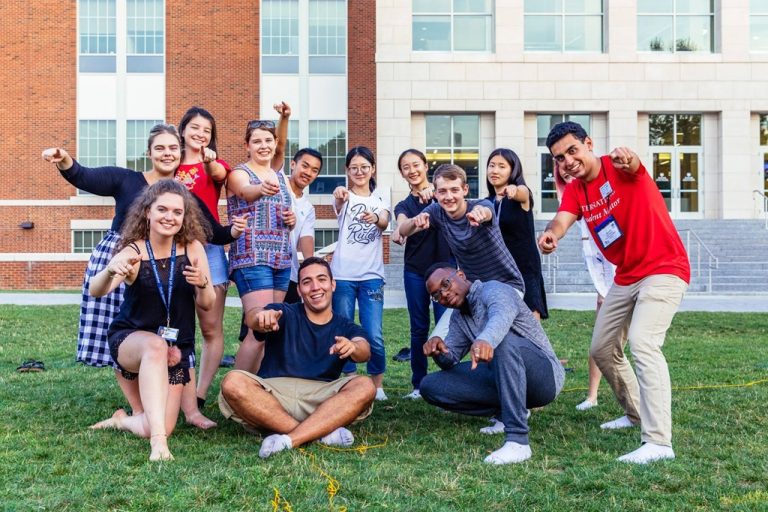What to Expect from Living in a Foreign Country During a Summer School Program
Attending a summer school program abroad can be one of the most enriching and exciting experiences of your high school or college years. Whether you’re drawn to the idea of studying at a prestigious university, learning a new language, or immersing yourself in a different culture, summer school programs abroad offer students the chance to broaden their horizons and gain experiences that can shape their personal and academic futures.
However, living in a foreign country, even for a short time, can come with its own set of challenges and adjustments. From navigating different housing situations and adapting to cultural differences to ensuring safety and making the most of your time abroad, there’s a lot to consider. This comprehensive guide will help you understand what to expect when living in a foreign country during a summer school program and offer practical tips on how to make the most of your international experience.
1. Housing: What to Expect and How to Prepare
Your living situation during a summer school program can significantly shape your overall experience. Depending on the country and the program you choose, your housing options may vary. Common accommodations for summer programs include student dormitories, homestays with local families, and shared apartments or hostels. Each option offers unique opportunities and challenges.
1.1 University Dormitories
If you’re attending a summer school program at a university, there’s a good chance you’ll be staying in student dormitories. Dorms are a great way to meet other students, particularly if you’re interested in forming friendships with people from around the world. These living arrangements also give you a firsthand look at what it’s like to live on a university campus, which is especially beneficial if you’re considering studying abroad for college.
Pros:
- Proximity to campus facilities like libraries, dining halls, and classrooms.
- Opportunities to meet students from diverse backgrounds and form a close-knit community.
- Often included in the program fee, making it a cost-effective option.
Cons:
- Shared rooms or bathrooms may feel less private than other housing options.
- Noise levels can vary, depending on your dormmates and building regulations.
- There may be limited cooking facilities, depending on the dorm setup.
Tips:
- Bring essential items like noise-canceling headphones, earplugs, or an eye mask if you’re concerned about sharing a room.
- Get to know your roommates and set ground rules for shared spaces, including cleanliness and quiet hours.
- Explore campus amenities, such as communal kitchens or laundry rooms, and get familiar with the rules early.
1.2 Homestays
Many programs offer the option to live with a local family through a homestay. This can be one of the most immersive ways to experience a new culture, as it provides you with a firsthand look at local customs, family dynamics, and daily routines. Homestays often offer greater language immersion, which can be a huge benefit if you’re studying a foreign language.
Pros:
- Deep cultural immersion through living with a local family.
- Language practice in real-world settings.
- Typically includes home-cooked meals, which can introduce you to authentic local cuisine.
Cons:
- Less independence compared to dorms or apartments.
- Potential language barriers or misunderstandings, depending on your level of fluency.
- You may need to adapt to the family’s routine and house rules.
Tips:
- Be open-minded and patient as you adjust to your host family’s routines and communication styles.
- Don’t be afraid to ask questions if you’re unsure about cultural norms or expectations in the household.
- Bring a small gift from your home country to express appreciation to your host family.
1.3 Shared Apartments or Hostels
Some programs provide students with shared apartments or hostel accommodations. This option may give you more freedom and independence compared to a dorm or homestay. Living in an apartment or hostel allows you to cook your own meals and explore the city at your own pace. However, it can also require more self-reliance, especially in terms of managing daily tasks like cooking and cleaning.
Pros:
- Greater independence and flexibility.
- The ability to cook your own meals and set your own schedule.
- Ideal for students who enjoy a more self-sufficient lifestyle.
Cons:
- Less structured support compared to homestays or dormitories.
- You’ll need to budget for groceries, utilities, and other living expenses.
- If you’re staying in a hostel, noise and shared facilities could be an issue.
Tips:
- If you’re sharing an apartment, set clear expectations with your roommates about chores and shared expenses.
- Make use of local grocery stores and markets to explore local foods while staying within your budget.
- Double-check the safety of the neighborhood where your accommodation is located before committing to a rental.
2. Cultural Adaptation: How to Adjust to Life Abroad
One of the most exciting aspects of attending a summer program abroad is immersing yourself in a new culture. However, cultural differences can sometimes be overwhelming, especially if you’re unfamiliar with the local customs or language. The key to a successful and fulfilling experience abroad is to approach cultural differences with an open mind and a willingness to learn.
2.1 Understanding Cultural Norms and Etiquette
Every culture has its own unique norms and etiquette, from how people greet each other to the way they interact in social or professional settings. What might be considered polite in your home country could be seen differently abroad, so it’s important to educate yourself about local customs.
Examples of Cultural Differences:
- Greetings: In some cultures, handshakes are common, while in others, people may greet each other with kisses on the cheek or bows.
- Personal Space: The concept of personal space varies greatly between countries. In some places, people stand closer together when talking, while in others, more distance is preferred.
- Punctuality: Some cultures value punctuality and view lateness as disrespectful, while others are more relaxed about time.
Tips:
- Research the cultural norms of the country you’ll be visiting before you leave. This will help you avoid unintentional faux pas.
- Observe how locals interact with each other and take cues from them in social situations.
- When in doubt, ask! People are generally happy to explain their customs and help you understand their culture.
2.2 Overcoming Culture Shock
Culture shock is a common experience for people who travel or live abroad, especially for extended periods. It refers to the feelings of confusion, frustration, or homesickness that can arise when you’re adjusting to a new culture. Culture shock usually occurs in phases, starting with initial excitement, followed by frustration, adaptation, and finally, acceptance and integration.
Tips for Overcoming Culture Shock:
- Stay positive: Remember that it’s normal to feel disoriented or overwhelmed when adjusting to a new environment. Give yourself time to adapt and try to focus on the positive aspects of your experience.
- Stay connected: While it’s important to immerse yourself in the local culture, staying in touch with friends and family back home can provide emotional support during challenging moments.
- Create a routine: Establishing a daily routine can help you feel more grounded and in control. Whether it’s finding a favorite café or going for a walk in a nearby park, small routines can bring comfort.
- Embrace the unfamiliar: Try new foods, participate in local customs, and engage with the community around you. The more you step out of your comfort zone, the faster you’ll adjust.
3. Safety: How to Stay Safe While Living Abroad
While living in a foreign country during a summer school program is generally safe, it’s important to take precautions to ensure your safety and well-being. Being proactive about your safety will allow you to fully enjoy your time abroad without unnecessary stress.
3.1 Know the Local Laws and Regulations
Different countries have different laws and regulations, and what may be legal in one country could be illegal in another. Before you travel, familiarize yourself with the local laws, particularly those related to alcohol consumption, drug use, and public behavior. Understanding the legal landscape will help you avoid unintended legal trouble while abroad.
3.2 Be Aware of Your Surroundings
When you arrive in a new city, take time to familiarize yourself with your surroundings. Pay attention to landmarks, transportation routes, and the location of your housing in relation to important places like hospitals, police stations, and embassies. Knowing where you are and how to get around will boost your confidence and help you navigate your new environment safely.
Tips for Staying Aware:
- Avoid walking alone late at night, especially in unfamiliar or poorly lit areas.
- Keep a copy of your important documents (passport, visa, student ID) in a safe place in case they are lost or stolen.
- Be cautious of your belongings in crowded places, such as public transportation or tourist areas, to avoid pickpocketing.
3.3 Health and Medical Care
Before you leave, research the healthcare system in the country you’ll be visiting. Some countries may have national healthcare systems that cover basic medical care for visitors, while others may require you to pay for services out of pocket. It’s important to have health insurance that covers you while you’re abroad, including emergency medical evacuation if necessary.
Tips for Staying Healthy:
- Stay up to date with recommended vaccinations for the country you’re visiting.
- Bring any necessary medications in their original packaging, along with a copy of your prescription.
- Know where the nearest clinic or hospital is located in case of illness or injury.
4. Making the Most of Your International Experience
Beyond the logistical aspects of housing, cultural adaptation, and safety, one of the most important parts of living in a foreign country during a summer program is making the most of the experience. This is your opportunity to not only learn academically but also to grow personally, develop new skills, and build lasting memories. Here are some practical tips to help you get the most out of your international experience.
4.1 Immerse Yourself in the Local Culture
One of the greatest benefits of studying abroad is the chance to experience a different culture firsthand. Don’t just observe from the sidelines—immerse yourself in the local customs, traditions, and way of life. Whether it’s trying new foods, learning the local language, or participating in cultural festivals, embracing the local culture will help you develop a deeper understanding of your host country and make your experience more enriching.
Tips for Cultural Immersion:
- Learn the Language: Even if your summer program is in English, learning a few basic phrases in the local language can go a long way in helping you navigate daily interactions and connect with locals.
- Explore Local Customs: Participate in local traditions and celebrations. If there’s a public holiday or cultural event happening during your stay, take part and experience it like a local.
- Engage with the Community: Build connections with locals by volunteering, attending community events, or simply striking up conversations in cafés or markets. These interactions will give you a more authentic view of the country.
4.2 Step Outside Your Comfort Zone
Living in a foreign country during a summer program is the perfect opportunity to challenge yourself and try new things. Whether it’s joining a new social group, experimenting with different foods, or navigating public transportation in a foreign city, stepping outside your comfort zone will help you grow and develop confidence.
Tips for Pushing Boundaries:
- Try Something New Every Day: Set a goal to do something different each day, whether it’s visiting a new neighborhood, sampling an unfamiliar dish, or participating in a local activity.
- Join Student Activities: Many summer programs offer extracurricular activities, such as field trips, sports, or cultural workshops. Participate in as many of these activities as you can to meet new people and expand your experiences.
- Take Risks (Safely): Whether it’s traveling to a nearby city on the weekend or hiking to a scenic viewpoint, push yourself to explore the world beyond your immediate surroundings while still taking necessary safety precautions.
4.3 Build Meaningful Relationships
One of the most valuable aspects of living abroad is the relationships you can build with people from different cultures and backgrounds. These friendships can last long after your summer program ends and can provide you with a global network of connections.
Tips for Building Connections:
- Be Open to New Friendships: Whether you’re staying in a dorm, homestay, or apartment, take the time to get to know the people around you. Introduce yourself to other students in your program, as well as locals you may meet in your daily life.
- Stay in Touch: After your program ends, keep in touch with the friends you’ve made. Whether it’s through social media, email, or messaging apps, maintaining these international connections can open doors to future opportunities, both personally and professionally.
- Attend Social Events: Take advantage of any social events or outings organized by your program. These events are not only fun but also provide a relaxed setting to bond with your peers and make lasting memories.
4.4 Document Your Experience
Your time studying abroad will be filled with unique experiences and adventures. Documenting these moments can help you reflect on your journey, share your experiences with others, and preserve your memories for years to come.
Tips for Documenting Your Time Abroad:
- Keep a Journal: Write down your thoughts, experiences, and feelings as you navigate your new environment. This will give you a chance to reflect on your personal growth and the challenges you’ve overcome.
- Take Photos: Capture the places you visit, the people you meet, and the activities you participate in. Photos are a great way to visually document your journey and share it with friends and family back home.
- Create a Blog or Vlog: If you enjoy writing or creating videos, consider starting a blog or vlog to chronicle your adventures. This can also serve as a helpful resource for other students considering studying abroad in the future.
5. Returning Home: Preparing for Reverse Culture Shock
Just as you experienced culture shock when you arrived in your host country, you may experience reverse culture shock when you return home. Reverse culture shock occurs when you find it difficult to readjust to your home culture after spending time abroad. You may feel like you’ve changed while everything at home has stayed the same, or you might miss aspects of the culture you’ve grown accustomed to during your time abroad.
Tips for Managing Reverse Culture Shock:
- Reflect on Your Experience: Take time to think about what you learned during your summer abroad. How has it changed you? What new perspectives have you gained? Journaling or discussing your experience with friends or family can help you process your emotions.
- Stay Connected to Your Host Country: Keep in touch with the friends you made abroad, continue practicing the language you learned, or follow news and events from your host country. Staying connected to the culture will help you ease the transition back home.
- Apply What You’ve Learned: Use the skills and knowledge you gained during your summer abroad in your everyday life. Whether it’s a new approach to problem-solving, a different way of interacting with others, or a greater appreciation for diversity, applying what you’ve learned will help you maintain a connection to your experience.
Conclusion
Living in a foreign country during a summer school program is a life-changing experience that offers academic enrichment, personal growth, and cultural immersion. While it may come with challenges like adjusting to new housing arrangements, overcoming culture shock, and ensuring your safety, the rewards far outweigh the difficulties. By embracing the experience with an open mind, stepping outside your comfort zone, and building meaningful connections, you’ll not only make the most of your time abroad but also gain skills and memories that will last a lifetime.
Remember, the key to a successful summer program abroad is preparation, adaptability, and a willingness to immerse yourself fully in the experience. From learning the local language to exploring new cultural norms, every moment abroad is an opportunity for growth and discovery. So, pack your bags, keep an open heart, and get ready for an unforgettable journey!






